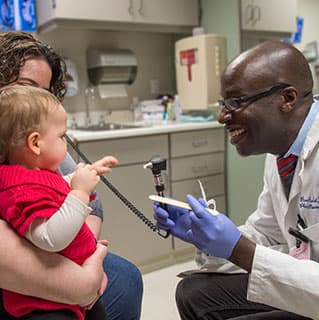Pediatric Craniofacial & Maxillofacial Surgery
Craniofacial and maxillofacial surgery is surgery of the face, jaw, palate and skull. Surgery can help a wide variety of congenital disorders and other problems by reconstructing the missing or damaged skeleton, correcting deformities of the skull, closing the palate and rebuilding facial features. This type of surgery has a goal of improving appearance while also ensuring good function of the face, jaw and skull.
Our team is comprised of experts from several pediatric specialties, including pediatric plastic and reconstructive surgeons, neurosurgeons, otolaryngologists (ear, nose and throat specialists), ophthalmologists (eye doctors), dentists, geneticists, speech and language therapists, mental health experts and radiologists. The Craniofacial Anomalies Multidisciplinary Program (CAMP) provides comprehensive, integrated care for children with craniosynostosis and other craniofacial disorders.
The pediatric craniofacial and maxillofacial surgery team treats various conditions, including:
Our surgeons are experienced in correcting all forms of cleft lip and cleft palate defects, working to establish normal feeding, speech and appearance.
Read more about our cleft lip and palate teamTreatment typically requires surgery to relieve pressure and restore head shape for children with craniosynostosis, a type of birth defect that involves the premature fusion, or closure, of one or more “seams” on a baby’s skull.
Plagiocephaly is a misshapen head due to repeated pressure to the same area of the head. Non-surgical treatments such as repositioning or wearing a specially designed helmet can restore head shape. Read more about head shape in infants.
Some syndromes, such as Bell's palsy, can cause partial paralysis of the face. Our pediatric plastic surgeons can perform facial reanimation by using nerve grafts and other techniques to improve facial movement and restore a child's ability to smile.
Read more about facial paralysisCongenital problems such as aural atresia and microtia result in absent, small or abnormally formed ears. In a combined effort, our pediatric plastic surgeons and pediatric otolaryngologists work together to treat these conditions. Otolaryngologists focus on improving hearing while plastic surgeons can construct the external (outer) ear using cartilage and or Medpor, flaps and skin grafts and other techniques.
Under- or overdevelopment of the upper jaw (maxilla) or lower jaw (mandible) can lead to problems with one’s bite. These conditions (dentofacial skeletal abnormalities or dentofacial anomalies) not only affect one’s bite (underbite, overbite, or crossbite) but can also affect eating and chewing, speech, breathing, appearance and therefore self-esteem. At Comer Children's, we routinely treat complex abnormalities of the jaws arising from growth problems.
Our team, comprised of craniofacial fellowship-trained plastic surgeons and top orthodontists, performs cutting-edge surgeries to align the jaws and treat the most difficult of deformities. We not only perform standard jaw surgery procedures, but also integrate advancing technologies in temporomandibular joint (TMJ) replacement surgery, distraction osteogenesis and facial orthopedics to optimize the result. Each case is customized, using virtual surgical planning (VSP) and 3D computer technology, bringing higher precision to the surgical and occlusal result.

Craniofacial Anomalies Multidisciplinary Program (CAMP)
Our Craniofacial Anomalies Multidisciplinary Program (CAMP), one of the largest in the region, provides a thorough, team-based approach for the evaluation, diagnosis and treatment of children with craniosynostosis.
Learn more about our CAMP program